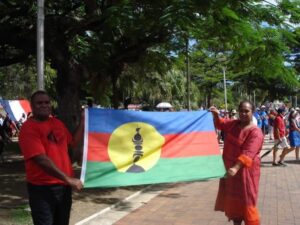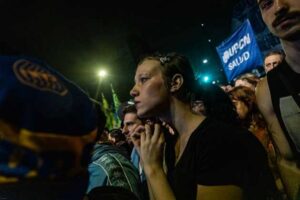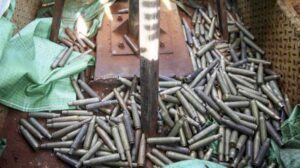Civil Society, Democracy, Global, Global Governance, Headlines, Human Rights, IPS UN: Inside the Glasshouse, North America, TerraViva United Nations
Donald J. Trump, President of the United States, addresses the General Assembly’s 75th session in September 2020. Credit: UN Photo/Rick Bajornas
– Republican Vice-Presidential nominee JD Vance and other speakers at the GOP Convention gleefully referenced the party’s latest icon: a wounded Donald Trump with blood on his face raising his fist in defiance beneath Old Glory’s stars and stripes.
The MAGA party realizes that they have a powerful symbol that will likely return Trump to the White House, because symbols are supremely powerful for both politics and religion. Associated Press photographer Evan Vucci captured the image, one of the most iconic ever recorded in American history. It fits perfectly into the Republican Campaign theme—“Trump is a hero and only he can save us.” The only other comparable photograph is the unforgettable one showing embattled Marines raising the American flag on Iwo Jima during WW II.
Vucci’s photograph framed a bloody former President, wounded in the assassination attempt, heroically pumping his fist in defiance beneath a red, white, and blue flag against a clear blue sky. It was the perfect photo, taken at a moment of extreme peril for American democracy, and sure to win a Pulitzer Prize.
It could be the key visual message that motivates people to side with Trump as a hero and propel him back to the White House. Photojournalist Doug Mills of the New York Times snapped a remarkable photo of the bullet in mid-air just beyond Trump, but Vucci’s stirring image of the wounded former president conveys a much more impactful message of heroism and patriotism.
Americans clearly prefer a tough, vigorous, even pugnacious and younger male leader (even if the image is false) to an old, decrepit President, especially one stammering to express himself and now sidelined with Coronavirus.
MAGA Republicans insist that people should vote for their hero Trump instead of Biden, pictured as a weak old man, or heaven forbid, by a scrappy female like Hillary Clinton, Kamala Harris, or even Republican Nikki Haley.
Aging leaders have been required to prove their virility from time to time throughout history—in ancient Egypt by running around a course, and in Communist China by swimming, or more likely floating, for ten miles in the Yangtze River, as did Mao Tse-tung in 1966.
His claim of fitness, especially in the photo of him swimming, became an icon across China and revived his political fortunes after the disaster of the Great Cultural Revolution.
Americans consider themselves to be a tough breed. That in turn requires a macho man to be our leader. Even if Trump is not really that, the picture of a defiant Trump surviving an assassin’s bullet and pumping his fist is an incredibly powerful icon at this moment of destiny in the nation’s politics.
There were no photos when Lincoln was shot and the Kennedy assassination photos show blurs in the back of a speeding convertible. The only other iconic photo to stir the emotions of patriotic Americans with equally intense feelings would be that snapshot by photographer Joe Rosenthal Showing US Marines raising the flag on Mount Suribachi.
That picture captured American patriotism so perfectly that it was later sculpted into a colossal statue near the US Capitol in Washington.
Not many people know about semasiography—the science of symbols—but throughout history symbols have had an underlying, supremely powerful influence on religion, politics, and human behavior. This photo of Trump, like the one of the marines, has the capacity to impact people at a visceral level and therefore to change human behavior on a large scale.
There is no question of the overwhelming influence of such a potent symbol at this point in an evenly balanced and fiercely divided, nation.
The way symbols work is like this: they are simple, convey meaning in a generalized sense, and have the capacity to rally multitudes of people, sometimes continuing to evoke allegiance for thousands of years. Many national flags in the modern era include symbols.
The red, white, and blue of the American flag can cause tears to flow, pride to swell the chest, and infuse soldiers with the courage to face cannons on the battlefield.
One of the most omnipresent symbols worldwide is the Christian Cross, which has provided meaning and identity for millions of people over thousands of years. The Nazi Swastika and the Hammer and Sickle rallied Germans and Russians, functioning in a similar way for unbelievably vast numbers of people during WW II.
The swastika, or broken cross, was an ancient Aryan cultural sign, meaning to the Germans “Deutchland Uber Alles,” the racial-political creed of Germany. Hitler was delighted when he found it, knowing he could use it to rally the nation to his banner.
The Soviet hammer and sickle dominated great parts of the globe for much of the Twentieth Century, signifying the rise of the Proletariat. During the Vietnam War, millions of college students protested wearing the peace sign in support of the anti-war movement.
A symbol can carry a different meaning for millions of people, allowing each individual to put his or her own meaning into it, often leading to action. In short, a symbol is a way to capture and intensify personal feelings.
An appropriate and timely icon can be used to lure, move, or drive masses of people toward a desired goal, even if its message is vague and diffuse.
Several modern psychiatrists have focused on symbolism, beginning of course with Freud. The study of semasiography became a major preoccupation of his most prominent successor, Jung. Both knew the power of symbols.
Soon the icon of a defiant Trump—the ultimate American tough guy—will appear on t-shirts and coffee mugs, helping to build a different national culture than the one bequeathed to Americans by Roosevelt, Eisenhower, Kennedy, and others of the Greatest Generation.
This new political culture has already shown its true colors—dominance, retribution, reaction, discrimination, with threats of violence and coercion as the new mechanism of control. Sadly, this is the way history works. Change is coming—prepare for it.
James E. Jennings is President of Conscience International and Executive Director of US Academics for Peace.
IPS UN Bureau











